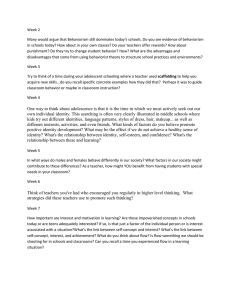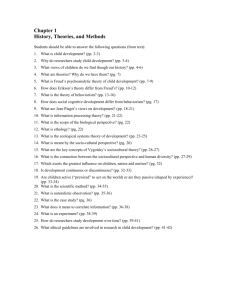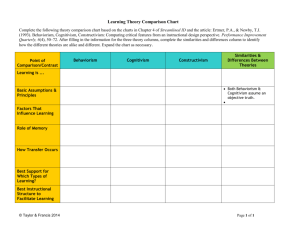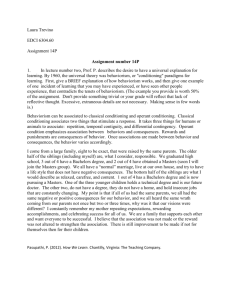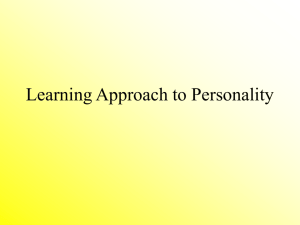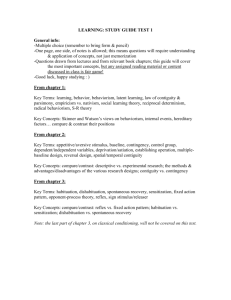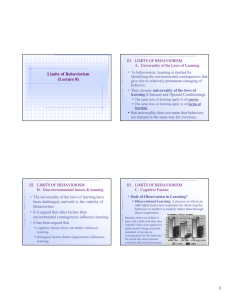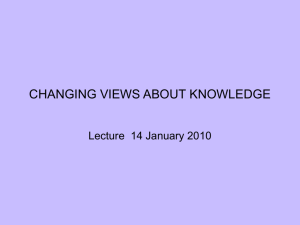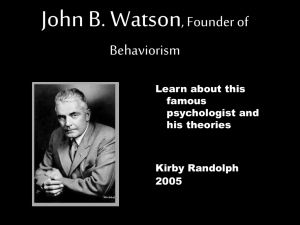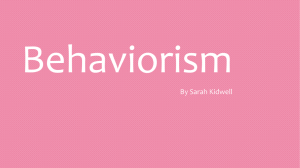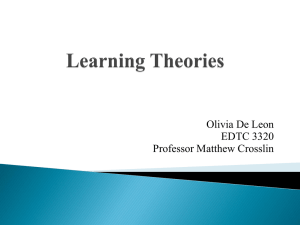reflections
advertisement
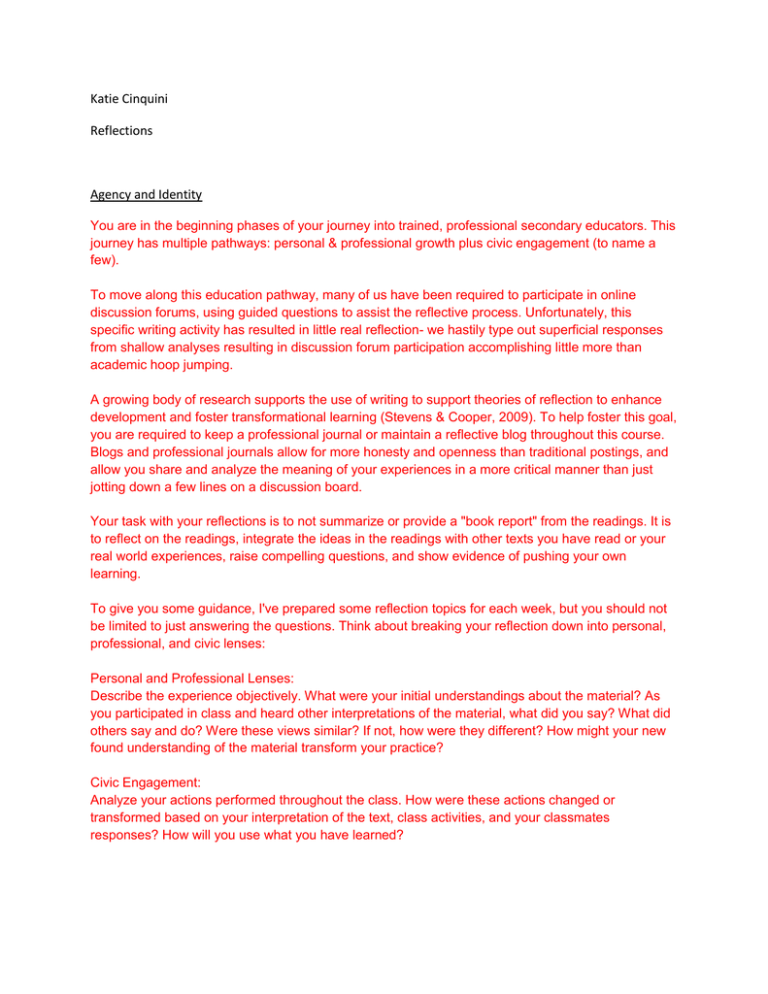
Katie Cinquini Reflections Agency and Identity You are in the beginning phases of your journey into trained, professional secondary educators. This journey has multiple pathways: personal & professional growth plus civic engagement (to name a few). To move along this education pathway, many of us have been required to participate in online discussion forums, using guided questions to assist the reflective process. Unfortunately, this specific writing activity has resulted in little real reflection- we hastily type out superficial responses from shallow analyses resulting in discussion forum participation accomplishing little more than academic hoop jumping. A growing body of research supports the use of writing to support theories of reflection to enhance development and foster transformational learning (Stevens & Cooper, 2009). To help foster this goal, you are required to keep a professional journal or maintain a reflective blog throughout this course. Blogs and professional journals allow for more honesty and openness than traditional postings, and allow you share and analyze the meaning of your experiences in a more critical manner than just jotting down a few lines on a discussion board. Your task with your reflections is to not summarize or provide a "book report" from the readings. It is to reflect on the readings, integrate the ideas in the readings with other texts you have read or your real world experiences, raise compelling questions, and show evidence of pushing your own learning. To give you some guidance, I've prepared some reflection topics for each week, but you should not be limited to just answering the questions. Think about breaking your reflection down into personal, professional, and civic lenses: Personal and Professional Lenses: Describe the experience objectively. What were your initial understandings about the material? As you participated in class and heard other interpretations of the material, what did you say? What did others say and do? Were these views similar? If not, how were they different? How might your new found understanding of the material transform your practice? Civic Engagement: Analyze your actions performed throughout the class. How were these actions changed or transformed based on your interpretation of the text, class activities, and your classmates responses? How will you use what you have learned? Evidence of Behaviorism I see behaviorism being used primarily in elementary schools, through brides, token economies, verbal and non-verbal praise. I think it is a common was of teaching young children because they understand and respect the concept of ‘I do this, then get this’. It is usually how their mind set is at that age so it fits into their life styles well. However, the use of behaviorism diminishes the older the student’s gets. I think that at some point they find their own motivation, and what the teacher has to say or offer isn’t going to change it as easily as when they were younger. I don’t really see behaviorism used much in my courses here at Western. I believe that professor know that we are adults are typically will do things the way we do things despite what they day or do. However, some professors will try. They will offer extra credit, or take off assignments as incentives for talking in class, or participating in activities. Sometimes this works for some students, but it all depends on their own motivation that they have already established. Punishment isn’t hugely emphasized either. Expectations, rewards, and punishments are stated at the beginning of the class, so students know how things will turn out depending on their effort. Majority of the professors I have had do not try and change the students. Like I said before, I believe the teachers realize the mentality most students have and don’t try to change that. I also believe so professors just don’t want to put in that effort. They say what they have to say, and class is over. The advantages to using behaviorist theory include motivated students, and achieving a desired outcome. When the right ‘reward’ or ‘praise’ is used it increases a student’s motivation to succeed. Also when the right kind is used, teachers can gear students’ actions toward a desired behavior or outcome. However, if not done in an effective manner or emphasizing the right thing, behaviorism is ineffective, and can have negative effects. Students might feel overwhelmed or bombarded by what teachers want them to do that they shut down, and stop trying. Or if the motivation is ineffective, then it is a waste of time, because the student’s behavior will not change. Scaffolding in Middle & High Schools In my AP Calculus class my teacher always broke things down into small or easier steps before having us do the larger problem or learn the whole concept. This was extremely helpful because of the complex nature of calculus. Many concepts cannot be tackled head on. You have to find a round-about approach. Scaffolding is so important no matter what is being taught or what age. There are always going to be concepts that students will need broken down, or shown in smaller steps. Teen Socialization Peers are very influential in the lives of teens, because they are in such an impressionable time. In my freshman year my best friend decided to go out for the track team. Because she was jointing I decided to join as well. I had had no desire to join before she said something about it, but because she was joining it became more appealing. Being aware of the friends your children or students have is very important, so you can be sure they are surrounded my good examples and influences. If you know that your children isn’t making good friends that would be the time to get involved. Talk with them about their friends; why those people, introduce them to others sooner rather than later. If they have friends that are good influences, then praise them for these good choices to emphasize them in the future. Gender and Special Needs In the past males and females have followed the gender stereotypes that had been set for their gender, but those stereotypes are beginning to break down. People are making choices based on their interests, likes/dislikes, and goals. It is less and less based on what others expected you to choose. These gender stereotypes came from a time of tight restrictions; this is not the case anymore. Each gender has many opportunities open to them, if they are willing to put in the work. Having working in a group home for adults with disabilities for 2 ½ years I know that I will gain more patience and have to develop skills that I don’t currently have, if I have a special needs student in my class room. I will be learning a completely new of teaching and honing in on innovative skills each time I have a new students who has a different disability. It will also present growth, as I work through the many challenges that will come as well. Identity Development The factors that promote positive identity development revolve around who we are influenced by. It goes back to the peer’s influences and the types of friends we have. The positive friends and relationships get students involved in positive things and help build a positive sense of self. If you chose to look at Maslow’s hierarchy of needs, then not achieving a healthy sense of identity effects all the other steps involved with reaching self-actualization. More simply I believe that not developing that positive identity alters your course of life. You cannot truly succeed without knowing who you are and what you are working for. Your identity is who you are; how you relate to other people and situations, your way of thinking. Selfesteem is how you feel about yourself; what you believe you can or cannot do, and how well. It is also how you see how others see you. Your confidence stems from your self-esteem. Your confidence grows as your self-esteem develops, and as you gain your confidence you have the power to try new, more difficult things, if the thought of failing how being so scary. Interest and Affect How important are interest and affect in learning? Are these impoverished concepts in schools today or are teens adequately interested? If so, is that just a factor of the individual person or is interest associated with a situation?What's the link between self-concept and interest? What's the link between self-concept, interest, and achievement? What do you think about flow? Is flow something we should be shooting for in schools and classrooms? Can you recall a time you experienced flow in a learning situation? Effective Classroom Activities In your own experiences as a student, what classroom activities were especially effective? What aspects of those activities made them effective?
